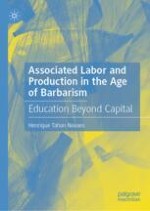2024 | OriginalPaper | Buchkapitel
4. Manifestations of Barbarism
verfasst von : Henrique Tahan Novaes
Erschienen in: Associated Labor and Production in the Age of Barbarism
Verlag: Springer Nature Switzerland
Aktivieren Sie unsere intelligente Suche, um passende Fachinhalte oder Patente zu finden.
Wählen Sie Textabschnitte aus um mit Künstlicher Intelligenz passenden Patente zu finden. powered by
Markieren Sie Textabschnitte, um KI-gestützt weitere passende Inhalte zu finden. powered by
